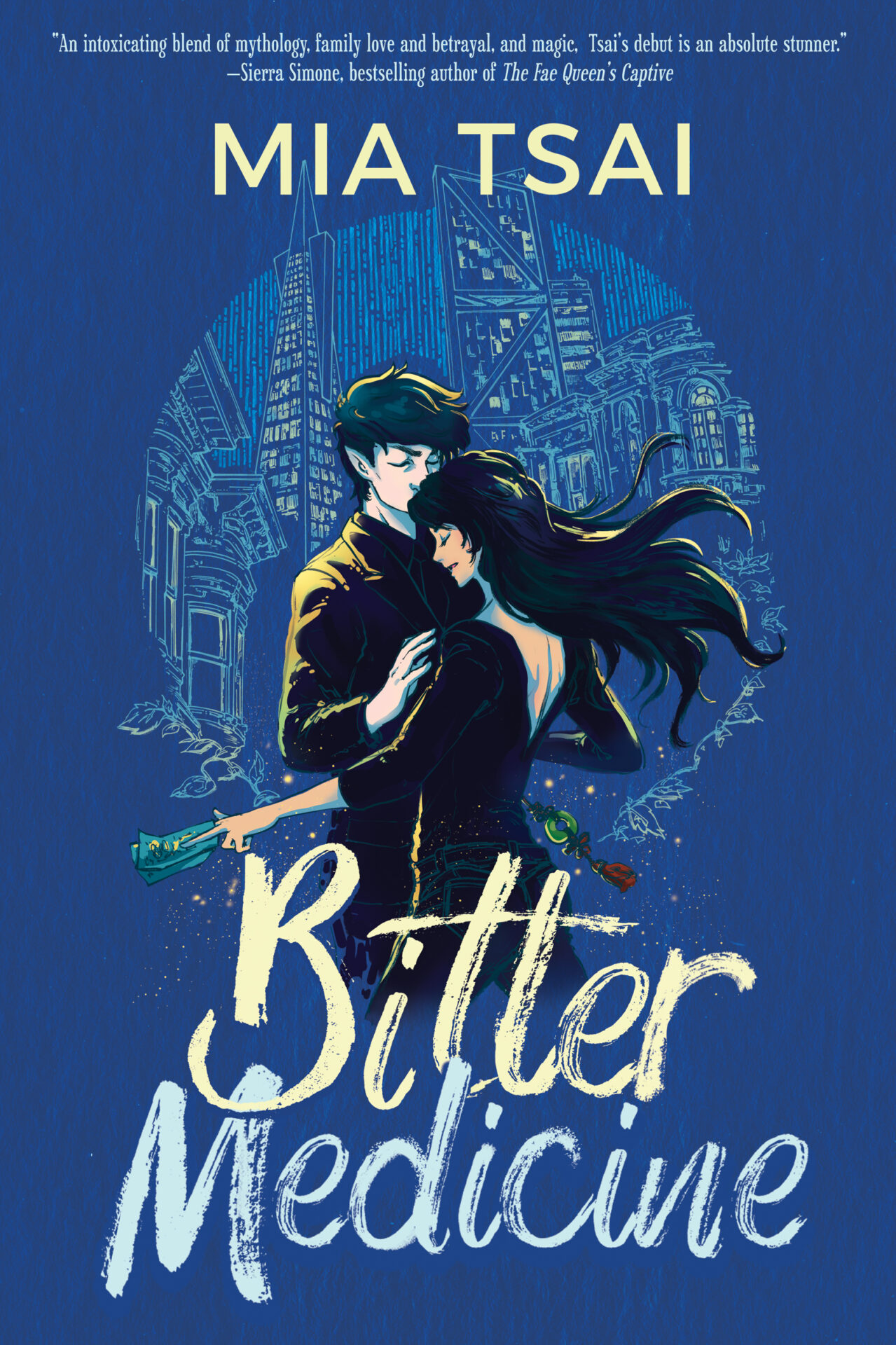
Mia Tsai is joining us today to talk about her novel, Bitter Medicine. Here’s the publisher’s description:
As a descendant of the Chinese god of medicine, Elle was destined to be a doctor. Instead, she is underemployed as a magical calligrapher at the fairy temp agency. Meanwhile dreamy half-elf Luc, the agency’s top security expert, has his own problems and secrets. In this xianxia-inspired contemporary fantasy, a Chinese immortal and a French elf navigate romance, family loyalty, and workplace demands.
What’s Mia’s favorite bit?

Mia Tsai
It took me a while to come up with my favorite bit from Bitter Medicine. “Surely,” people say, “you must have a single favorite part!” Never mind that I have always struggled to have a favorite anything because there are too many things I love. Or conversely: “Surely, a writer must love everything she has written. Aren’t books your babies? Isn’t it difficult to choose?”
And yes, it’s difficult to choose because there’s a plethora of things to choose from, and it indeed is love (or a contract) that gets us to write books. But also, by the time a book comes out, it’ll have been years between when we wrote it and when it’s available to readers, which means the things that we held on to when we were writing have been packed away and archived and, in some cases, forgotten.
I wrote the first draft of this book in 2015. The final version was essentially done and dusted in 2021. I’ve since written a whole other book and fast-drafted a couple of book concepts. I had to sit and ponder and ask other people what they thought my favorite bit should be in Bitter Medicine. The sex scenes, maybe? Or the dick jokes? The calligraphy? Maybe the parts of the book where I go into full xianxia mode, where there’s acupuncture and qi manipulation? But all that, I fear, would spoil significant portions of the book. Well, thought I. What about the code-switching? Except I cover that in the afterword.
Enter the ESL (English as a second language) jokes.
Okay, actually, there is only one ESL joke in Bitter Medicine—the other instance is less a joke and more a realistic depiction of how English fluency can fail for Mandarin speakers when the speaker is very tired—but it is one of my favorite parts of the book. Bitter Medicine is a multilingual book with a set of international characters, and though English is the linguistic glue that holds them together, it’s also a language that takes effort, as does any language that isn’t your primary (and sometimes it’s difficult even when it’s your primary). There are words that describe things much more succinctly or beautifully in non-English that get reached for first, and then they have to get translated into English, except the brain can run interference on itself.
A little bit of background for this ESL joke: both main characters, Luc and Elle, are fluent in English, but it isn’t their first language (or their second, or even their third, in Luc’s case). So, whereas navigating an English-primary world isn’t a problem for them, sometimes, like scientific process, language skills go “boink.” Elle is a bit flustered because she’s been cornered into doing something she both wants and doesn’t want to do, and her client, Luc, who is too handsome to be alive and has altogether too much faith in her abilities, is asking for a favor. Here’s the dialogue.
She cocks an eyebrow. “An immortality serum would cost you a million cool ones.”
“Cool what?”
“Cool ones. You know, money.”
[Luc] tries not to laugh, closing his eyes briefly, taking a measured breath. He hasn’t heard that phrase before. Coming from her, it’s adorable. “Do you mean a cool million?”
“No, cool ones. Don’t you call money ‘cool ones’ in French or something?”
“No, and I don’t think we call it ‘cool ones’ in English either.”
Elle scowls. “I said what I said. Cool ones. A million of them.”
Very seriously, he replies, “I will have to check the cool ones bank to see if I have the funds should I want to live forever. You’re still underselling yourself. That’s an unreasonably low price.”
I’ve been in situations like these in both English and Chinese, where I’m chugging along, fluency at a hundred percent, and suddenly, for no reason whatsoever, I stop being able to grasp words or lose comprehension (don’t get me started on the word “pun,” which I thought was an acronym for the longest time because my brain went “Play UpoN words” and I just went “Isn’t that weird that the W of words ends up missing? A play upon nwords, but the N is silent?”). And expressions in any language are quite challenging. Here, we see Elle attempt to say a cool million, except . . . it ends up being cool ones.
It’s funny if you say it out loud, I swear.And Luc, being who he is, just rolls gamely with it and one-ups her with the cool ones bank when she refuses to admit she’s made a mistake. There you have it: an encapsulation of the language themes in Bitter Medicine, a microcosm of what Luc and Elle’s personalities and relationship are like, an ESL joke that’s probably in the top five best jokes list, and the cleanest joke in the whole book.
LINKS:
BIO:
Mia Tsai is a Taiwanese American author of speculative fiction. She lives in Atlanta with her family and, when not writing, is a hype woman for her orchids and a devoted cat gopher. Her favorite things include music of all kinds (really, truly) and taking long trips with nothing but the open road and a saucy rhythm section. She has been quoted in Glamour once. In her other lives, she is a professional editor, photographer, and musician. Mia is on Twitter at @itsamia and on Instagram at @mia.tsai.books.
